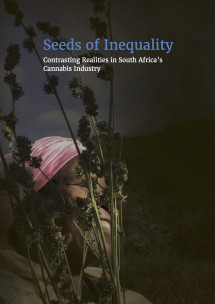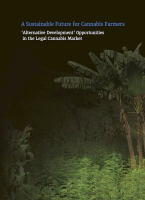Seeds of Inequality Contrasting Realities in South Africa’s Cannabis Industry
Topics
Regions
Publication date:
30
minutes read
Amidst the global resurgence of interest in cannabis, South Africa grapples with the dual challenges and opportunities of establishing a regulated cannabis industry. While economic expectations soar, current licensing systems favor a select few corporations, sidelining traditional small-scale farmers. Urgent policy reforms are imperative to address this inequality, protect legacy farmers, and preserve regional strains, ensuring a socially just and economically sustainable cannabis landscape.

Downloads
Seeds of Inequality: Contrasting Realities in South Africa’s Cannabis Industry
(PDF, 5.93 MB)
Average time to read: 30 minutes
Authors
Key points
- With the renewed global interest in cannabis, South Africa, historically a cannabis producer, is currently navigating the challenges of and opportunities to create an inclusive and regulated cannabis industry.
- Despite the high expectations of economic growth and the alleviation of poverty, the current cannabis licensing systems largely favour a small group of corporations, side-lining traditional small-scale farmers. This underscores the urgency of establishing inclusive policies to mitigate this structural inequality.
- The traditional cannabis farmers face many challenges as the industry evolves, including demand shifting towards high-grade strains and self-cultivating users. These changes threaten the economic viability of traditional farmers, resulting in declining living standards, food insecurity, and socio-economic stress.
- Although there is considerable economic potential in landrace cultivation by smallholders in the Dagga Belt region for medicinal and recreational adult-use, and in the industrial sectors, there are currently no legal pathways to use this production. Rural legacy farmers can thrive economically only when legal reforms are aimed at empowering them.
- Unequal economic participation in the cannabis sector will result in losing traditional cultivation practices and indigenous genetics of regional strains. Urgent protective measures are essential to ensure their survival, with legacy farmers playing a vital role in this preservation.
- Addressing this economic and political inequality in the cannabis industry requires policy reforms, in which it is crucial to give priority to resource-poor legacy farmers. An important step to prevent a further downward spiral of poverty and to unlock economic potential is the implementation of the policy principles established in the Phakisa Action Lab.
- Instead of preferential terms for the corporate cannabis industry, new policies need to create preferential conditions for traditional cannabis growers. These communities have suffered under the prohibitionist regime for decades, and reparations in the form of preferential economic opportunities are the least a social justice-oriented policy should offer.

